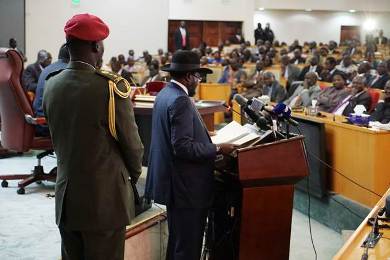South Sudan president sworn in for three more years in office
July 8, 2015 (JUBA) – South Sudanese president Salva Kiir has vowed to end the 19-month long civil war in his country “at any cost” and commended the national legislature for extending his electable term of office for three more years despite its expiry on 21 May this year.

“It is important to note that we are inaugurating the three years extension of the presidency and mandate, after I have completed five (5) years term of office as the president of the Republic of South Sudan, having won the 2010 presidential elections,” he told the parliament.
He reassured that in the three years term granted to him by parliament he would achieve peace and set right a programme for development in the country.
President Kiir did not take an oath office today because parliamentary speaker, Manasseh Magok Rundial, said extending the term of office does not require a fresh swearing in.
With the amendment of Transitional Constitution 2011 for three years, president Kiir’s term will end on July 9, 2018.
SUCCESS AND FAILURE
President Kiir said the successful conduct of January 2011 referendum and declaration of independence from Sudan six months later is a “personal privilege.”
“For me as a person, the opportunity to lead my people to freedom and independence at last was the greatest achievement and privilege that I felt and I am deeply humble by that gift from the Almighty God,” he said.
The president, who took over the political helm of South Sudan following the death of SPLM founding leader, John Garang, in July 2005, said there have been failures in delivering services to the citizens due to corruption and institutional weaknesses.
The president told the lawmakers he admitted “failure” of his government since independence to deliver services to the citizens due to corruption and institutional weaknesses. Also he blamed the neighbouring Sudan for allegedly “sabotaging” South Sudan’s programmes, further accusing Khartoum of “looting resources of South Sudan.”
He also partly blamed the failure on what he said was a poor system of governance in South Sudan, which resulted to mismanagement of resources, corruption, lack of law enforcement and procedures.
“Therefore, all the plans that were compiled by various institutions of my government for major infrastructure development of strong governance institutions failed to materialize, to large extent,” he said in the statement he delivered to the members of parliament.
PEACE PROCESS
On the peace process the president pointed out the commitment of his government to finding a resolution of the conflict, but blamed the rebel group led by his former deputy, Riek Machar, of violating the cessation of hostilities agreement which both sides signed since 23 January 2014.
He maintained that Machar attempted a military coup on 15 December 2013, which he said, resulted to the war and the destruction incomparable to the 1991 split.
“Even Riek’s own 1991 rebellion that nearly wrecked the SPLM/SPLA and set back the liberation clock by not less than ten years was less destructive by comparison,” he said.
The president also lashed at the East African regional bloc, the Intergovernmental Authority on Development (IGAD), for proposing a draft peace agreement, assuring the parliament that his government will not accept it.
“But you can be sure that proposals such as the one on ‘demilitarizing the national capital’ and bringing in third party units under a UN, AU or IGAD mandate will not be entertained by this government. Nor shall we accept the maintenance of two armies for 18 months and the surrender of the three Greater Upper Nile states or any state in Bahr el Ghazal or Equatoria as demanded by Riek’s rebel movement,” he said.
“These proposals are so arbitrary in nature that you wonder what criteria or justification the IGAD proponents considered,” he challenged.
Meanwhile the leader of the armed opposition faction, Machar, issued a statement on Wednesday, declaring president Kiir and his “regime” as illegitimate by 8 July midnight the time he said his five-year constitutional term would have expired.
He also called on Kiir to step down or face uprising to overthrow him and further appealed to member states in the region and the wider international community to not recognize his “unconstitutional” presidency and isolate his regime.
(ST)
